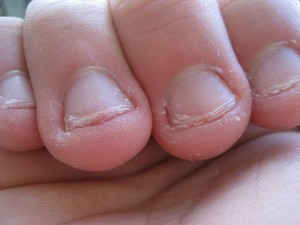Onychophagia – Nail Biting
While many children and teens develop fingernail biting habits, it’s something that most people outgrow.
But for between 10% and 20% of adults, nail biting is a tough habit to shake, and it’s one that can cause embarrassment, physical pain and an increased risk of infections. Fortunately, if you’re determined to break free from a nasty habit, there are some easy self-help steps you can take that and that really work, and if you find that doing it on your own isn’t working and/or if you’ve got a very severe case, there are also psychotherapies and even medications that can make it easier.
In more rare severe cases, compulsive nail biting may become a mental health disorder, with similarities to trichotillomania (hair pulling) or skin picking disorder. Although at this time compulsive nail biting is not yet recognized as a specific disorder in the DSM-IVr, those that treat people with severe compulsive nail biting problems suggest that the condition likely falls somewhere in the obsessive compulsive disorders category umbrella.1
Why Make Such a Big Deal? – The Consequences of Nail Biting!
Nail biting does not result in any serious medical complications, on its own, though it is unsanitary and frequent hand to mouth contact does increase the risk of infections. Other consequences of nail biting can include
- Red, raw and painful fingertips
- Skin infections on the fingers
- Embarrassment
- Feelings of shame at being unable to control a habit
- Gum infections and other dental problems
How Many People Bite Their Nails, and Why Do They Do It?
Nail biting is a very common phenomenon.
- 28% to 33% of children aged 7 to 10 bite their nails
- 44% of teens do it
- 19% to 29% of young adults bite their fingernails
- Between 10% and 20% of fully grown men and women continue to bite their fingernails2
People bite their nails both consciously and unconsciously. Nail biting often occurs when you are:
- Stressed
- Anxious
- Bored
- Excited
Nail biting can be soothing in times of stress or anxiety and can offer some degree of stimulation when bored or tired. People with nail biting habits often report feeling a sense of needing to bite their nails and a sense of gratification during and immediately after the act.
Post a comment 0
Copyright Notice
We welcome republishing of our content on condition that you credit Choose Help and the respective authors. This article is licensed under a Creative Commons License.
Helpful Reading:
-
 N-acetylcysteine (NAC) for Impulse Control Disorders
N-acetylcysteine (NAC) for Impulse Control Disorders
Could an inexpensive over-the-counter amino acid supplement really help you best your hair-pulling, skin picking, nail biting or other form of impulse control disorder? Initial research suggests that it just might.
Read the complete article -
 Compulsive Shopping Disorder
Compulsive Shopping Disorder
People with compulsive buying disorder buy when they feel down and they buy to good – unfortunately, those good feelings are quickly replaced by guilt, remorse and by ever more financial problems and credit card debt. If you think you’re a ‘shopaholic’ you may well have a mental health disorder that’s not going away on its own.
Read the complete article -
 Dermatillomania
Dermatillomania
If you pick at your skin long and hard enough to cause sores or lesions on a re-occurring basis and you feel distressed about your habit and/or your inability to control your picking habit, then you may have skin picking disorder (dermatillomania) a treatable type of impulse control disorder. Learn more about getting diagnosed, the causes and consequences and the treatments that are used to reduce the severity of symptoms.
Read the complete article

 John Lee
John Lee



